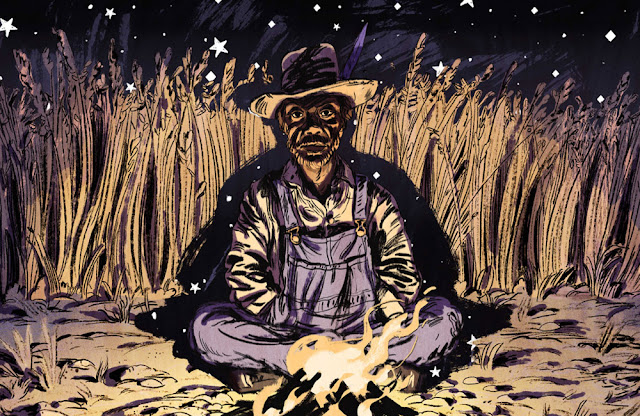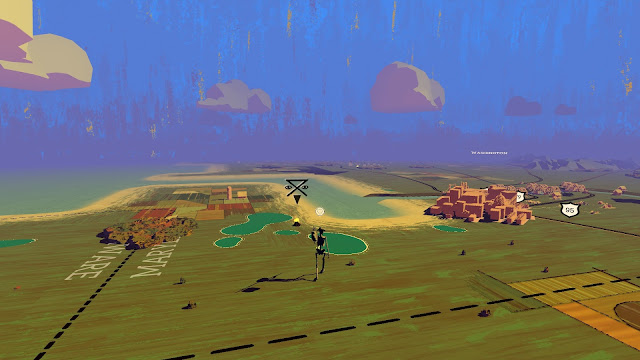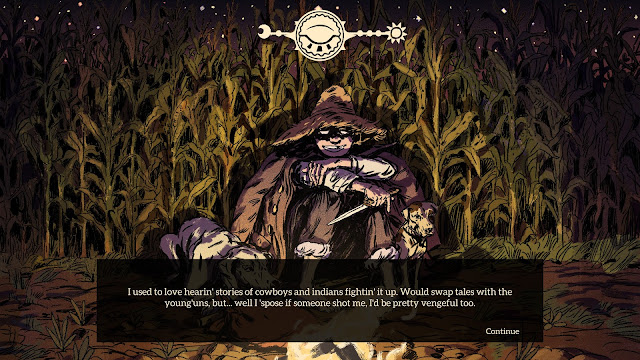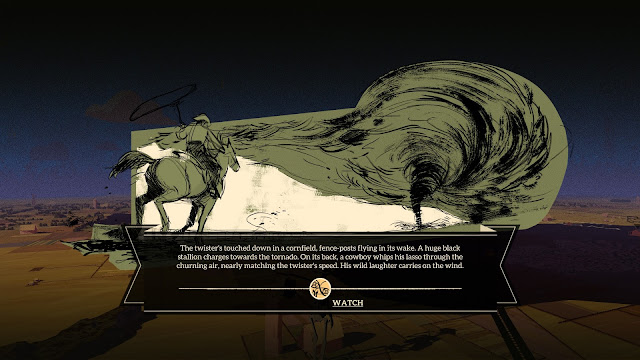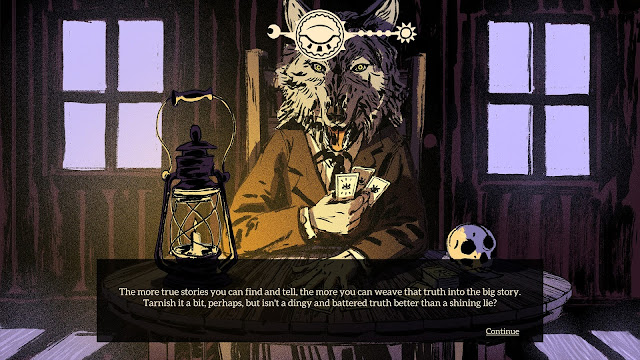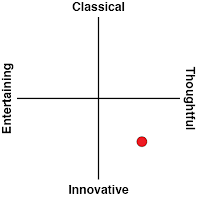Review by Matt C.
Where the Water Tastes Like Wine is a game about stories and storytelling. Set amid the Great Depression, it looks at how stories grow and evolve over time: how a sweet but relatively mundane tale of long-lost siblings reuniting can morph into a myth about spirits endlessly searching for one another across the seas; how an account of a fairly typical arrest grows into a legend of the deadliest bootleggers the country’s ever seen. It looks at how stories travel, more rapidly than car or carriage ever could, and weave together to form a folkloric mesh that wraps around a whole country. It looks, too, at the power of stories as a way of processing the world and the often horrific things that happen within it.
The game begins with your mysterious, nameless protagonist stumbling upon a card game. Before long, only two players remain: yourself and the cunning Dire Wolf, voiced brilliantly by Sting. When you inevitably lose, the wolf offers you a curious way to pay what you owe: “To pay your debt to me, you’ll be carrying stories. Finding the seeds, first, and then spreading them. Telling them onwards so they can begin gaining strength. This is no light task—stories are heavy.”
With that, Where the Water Tastes Like Wine begins in earnest, as you find yourself on a map of the United States. Icons dot the landscape, and you soon learn that by interacting with these, you get to witness some event or other. Each of these plays out in a visual novel style, complete with utterly gorgeous hand-drawn art. More importantly, whatever you see becomes a story that you can tell.
Elsewhere on the map, you find campfires, which let you spend the night speaking with one of the transient people who make up the game’s main cast. As you chat with them, they’ll share snippets of their lives, though they’re (understandably) cagey at first. They’ll also ask you to tell them stories, and this is where those tales you’ve been collecting come into play.
The camper wont simply ask for any old story; rather, they’ll ask for something specific: a hopeful story, maybe, or something exciting or scary. It’s up to you, then, to find the best option in your growing “inventory” of tales. Tell the audience what they want to hear, and they’ll slowly open up to you, but you can only tell a limited number of stories each night. Regardless of the outcome, when the sun rises, your fireside friend will go on their way, and you’ll have to find them again if you want to continue your chat.
This forms the mechanical backbone of Where the Water Tastes Like Wine. There are 16 of these characters dotted across the country, and even if your storytelling has a perfect success rate, it’ll take at least a few nights to hear each of their tales in full. You can’t tell any one person the same story twice, either, so you need to keep building up your collection of stories by travelling across the countryside. (At the risk of being reductive, you could think of this game as an open-world visual novel, which is itself a fascinating concept.)
But stories aren’t simply told; they’re exchanged. Once shared, a story takes on a life of its own, being told and retold across slave and time. As well as the events and campfires, Where the Water Tastes Like Wine also regularly throws up nodes where you can hear a story—invariably, one you told to a camper previously, which has since grown and been embellished. In this way, the stories in your inventory evolve, becoming less believable but more fantastical.
One of the first stories you witness is a fairly mundane arrest of a pair of bootleggers, but that turns into a tale of a massive shootout through its retelling. Eventually, it becomes a legend of famous outlaws, the truth at the heart of the story be damned.
The stories heard from the campers also grow, but in a different way. As you get to know each person, and they share more of their life with you, you build a bigger, more honest account of where they’ve been and what they’ve been through. You can share these stories with other campers, too, and being more complex than the usual story vignettes, they act as a sort of wildcard that can meet whatever it is that the person you’re speaking with wants to hear.
That said, they’re tragic stories, by and large. One tells of a grifter who, having fled an abusive relationship, gets by scamming casinos and running from the law. Another is the tale of a young kid who was sent away from home and left to fend for herself because her parents couldn’t afford to support her. There are stories of the racial politics—and the human impact thereof—of depression-era America, and of the struggle for soldiers to reintegrate into society after returning from World War I.
Each of these stories is written by a different author, with some well-known game critics like Cara Ellison, Austin Walker, and Leigh Alexander along their number. The result of this is that each tale has its own unique style, further selling the idea of these being the accounts of living, breathing individuals, each with their own lives and backgrounds. The stellar voice acting also goes a long way, with the likes of Melissa Hutchison, Cissy Jones, and Dave Fennoy giving some of the best performances of their careers.
The little vignettes that make up your inventory of stories is even more varied. You’ve got everything from the mundanity of everyday life to the bleak reality of life in the depression, to truly outlandish things like talking animals and ghostly encounters. You might spend an evening sheltering from the rain with a friendly pair of gay lighthouse keepers; you might witness a living couple torn apart by the need to travel thousands of miles for work; you might watch a cowboy ride into a tornado and disappear.
All these different stories, from the collectible vignettes and the main characters’ personal accounts, come together to form a brilliant patchwork of America’s folklore traditions—including, crucially, the Native American and Latino aspects that so often get missed. Stories are the building blocks of society, and that’s something that Where the Water Tastes Like Wine puts front and centre.
The objective in all this is, ostensibly, to complete all 16 of the “main” stories and share them with the Dire Wolf, thus repaying your debt to the wolf. The old adage about journeys and destinations rings truer here than ever, though; the ending is rather anticlimactic. At first, I was frustrated by this (in fact, I wondered if I’d actually finished the game at all, thanks to a rare bug that meant the credits didn’t roll when they were meant to), but the more I think on it, the more I think that frustrating lack of resolution is deliberate. Stories, as they’re presented here, don’t really “end”; they simply grow and travel and move with the times. Similarly, in the real world—particularly in the depression era—stories rarely have neat, happy endings. It makes perfect sense, then, that Where the Water Tastes Like Wine would end the way it does, and I wouldn’t have it any other way.
A few other little features round out the package: there are light survival and RPG elements, through which you can earn money (if you’re lucky enough to find work) and use that to pay train fares or buy food. Certain narrative decisions may cause you to lose health, and you can die if you’re careless, though that’s easily avoided and there isn’t much punishment for it—you simply get to speak with the wolf again and seek his advice, before returning to where you were before you died.
The map itself covers the full span of the United States, from coast to coast and from border to border. Travelling around is slow-going—mostly walking, with the occasional train ride or hitch hike—but that’s a very deliberate move that instills that sense of travel and transience. You can walk slightly faster by whistling, which involves a simple rhythm game. That might seem like a small addition, but it’s hard to describe the thematic impact of slowly walking along a barren highway in the Midwest with just your whistles as company.
It also helps that the soundtrack for Where the Water Tastes Like Wine is phenomenal. It’s a folksy, bluesy, country mix—appropriate, given the game’s setting and ideas—with different arrangements of the same small handful of songs. Depending on where you are on the map, you hear different renditions of these songs—around New Mexico and the southernmost end of California, the arrangements have more of a Latin influence and Spanish lyrics; around places like Louisiana and Chicago, there’s more of a blues flavour. This isn’t just about setting the mood, though it does a good job of that; the music ties directly in to the themes of the game, given the inherent connection between music and storytelling, and the particular importance of music during the depression.
In short, Where the Water Tastes Like Wine is an incredible achievement, and the latest in a growing body of games that really push the bounds of what the medium can do. It is, at its heart, a game about stories, and the incredible power that they have, brought to life in the most beautiful way possible.
– Matt C.
Contributor
Find me on Twitter: @MC_Odd

